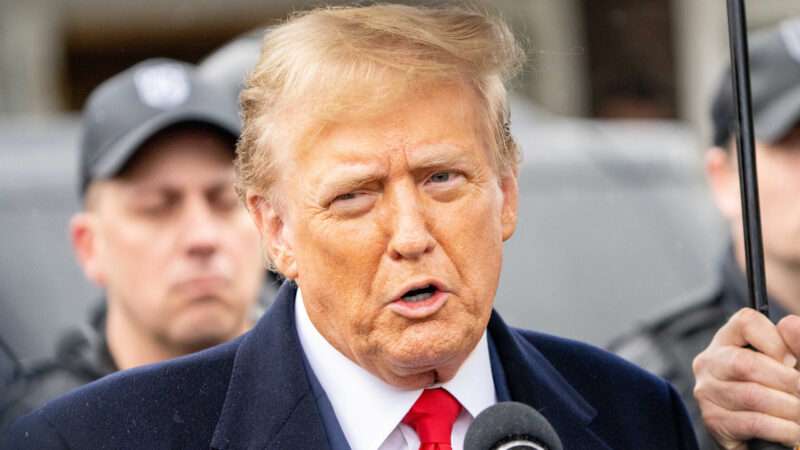
"On abortion," The New York Times claims, former President Donald Trump "chose politics over principles." In reality, Trump's recent clarification of his abortion position is one of those rare instances when political expedience coincides with constitutional principles.
In a Truth Social video posted on Monday, Trump said each state should be free to regulate abortion as its legislators and voters see fit. The result, he conceded, would be a wide range of policies, including liberal regimes that allow nearly all abortions as well as strict bans.
Through his Supreme Court appointments, Trump bragged, "I was proudly the person responsible for the ending of" Roe v. Wade, which for half a century overrode state policy choices by ruling out most abortion restrictions. With that obstacle removed, he said, "the will of the people" should prevail in each state.
That view jibes with what the late Supreme Court Justice Antonin Scalia, a longtime Roe foe, imagined would happen after the decision was overturned. Scalia complained that Roe "destroyed the compromises of the past, rendered compromise impossible for the future, and required the entire issue to be resolved uniformly, at the national level."
Trump's statement nevertheless provoked criticism from pro-life activists who want to renationalize the abortion issue in the opposite direction. Marjorie Dannenfelser, president of Susan B. Anthony Pro-Life America, was "deeply disappointed" by Trump's position, complaining that it "cedes the national debate to the Democrats who are working relentlessly to enact legislation mandating abortion throughout all nine months of pregnancy."
If those Democrats are successful, Dannenfelser warned, "they will wipe out states' rights." But the same could be said of Republicans who disregard Scalia's objection to Roe by trying to "uniformly" resolve the issue "at the national level."
In 2022, for example, Sen. Lindsey Graham (R–S.C.), who joined Dannenfelser in criticizing Trump's comments, proposed a federal ban on abortion after 15 weeks of gestation. Although such a law would cover only a small percentage of abortions, the bill dismayed many of Graham's Republican colleagues in the Senate.
Senate Minority Leader Mitch McConnell (R–Ky.) said most of them "prefer this be handled at the state level." Sen. John Cornyn (R–Texas) likewise said "my preference would be for those decisions to be made on a state-by-state basis."
Sen. Shelley Moore Capito (R–W.Va.) concurred. "I don't think there's an appetite for a national platform here," she said. "I'm not sure what [Graham is] thinking," she added, "but I don't think there will be a rallying around that concept."
There was not. Graham's bill, which attracted just nine co-sponsors, died in committee.
What McConnell et al. described as a matter of "preference" and "appetite" is actually mandatory, because the Constitution does not give Congress the authority to regulate abortion. Graham implausibly invoked the 14th Amendment's guarantees of due process and equal protection, which apply to "any person," a category that he said includes fetuses.
Although some abortion opponents have long favored that interpretation, the Supreme Court explicitly rejected it in Roe and so far has declined to revisit the issue. More commonly, members of Congress, including Democrats seeking to protect abortion rights as well as Republicans trying to limit them, have relied on an absurdly broad understanding of the power to regulate interstate commerce that obliterates the constitutional distinction between state and federal authority.
Trump's embrace of abortion federalism makes political as well as constitutional sense. Republicans are dealing with the electoral fallout from Roe's reversal, including shifts in public opinion, rejection of stricter abortion policies by voters in red and purple states, and the surprisingly strong performance of Democrats who oppose those policies.
Given Trump's history of asserting extraconstitutional powers, his abortion stance probably is motivated by partisan concerns rather than federalist principles. But that does not mean he is wrong.
President Joe Biden, meanwhile, favors constitutionally unauthorized legislation that would re-establish a federal right to abortion. On this issue, Trump has improbably managed to claim the high ground.
© Copyright 2024 by Creators Syndicate Inc.
The post Trump's Abortion Stance Is Convenient, but That Does Not Mean He's Wrong appeared first on Reason.com.







